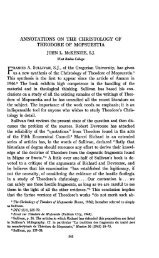contraception and the natural law: a recent study - Theological Studies
contraception and the natural law: a recent study - Theological Studies
contraception and the natural law: a recent study - Theological Studies
Create successful ePaper yourself
Turn your PDF publications into a flip-book with our unique Google optimized e-Paper software.
426 THEOLOGICAL STUDIES<br />
traordinary means by disconnecting a heart-lung machine). What is intrinsically<br />
evil is only to act in such a way as not to respect this good as irreducible<br />
ideal, i.e., to submerge or subordinate <strong>the</strong> good in <strong>the</strong> intention that<br />
<strong>the</strong> act by its very nature requires. In o<strong>the</strong>r words, that act is intrinsically<br />
<strong>and</strong> <strong>the</strong>refore always immoral in which <strong>the</strong> agent necessarily, by <strong>the</strong> very<br />
nature of <strong>the</strong> act, intends as end or means <strong>the</strong> nonrealization of <strong>the</strong> good.<br />
For this reason, certain types of conception-preventing behavior are always<br />
immoral, no matter how great <strong>the</strong> good that may result from it.<br />
Grisez's conclusion would follow unquestionably from any <strong>the</strong>ory where<br />
<strong>the</strong> operative norm of obligation was <strong>the</strong> end of <strong>the</strong> faculty or act, comm<strong>and</strong>ed<br />
by a divine legislator. But he rejects such <strong>the</strong>ories as inadequate.<br />
Can he, in his preferred framework of irreducible human goods, logically<br />
prohibit any given external act without qualification? Should not his sole<br />
norm, "a constant, positive love of each of <strong>the</strong> essential goods" (p. 87), a<br />
"willing that <strong>the</strong>y be" (p. 91), in its practical application look only to <strong>the</strong><br />
total results of <strong>the</strong> action, to what extent it works on <strong>the</strong> whole for or against<br />
<strong>the</strong> concrete realization of <strong>the</strong> goods? But this, Grisez recognizes, leads to<br />
<strong>the</strong> possibility that any given action may, at least in exceptional circumstances,<br />
be justified. With remarkable honesty <strong>and</strong> lucidity in his effort to<br />
avoid <strong>the</strong> conclusions of situationism, he depicts his moral man as one who,<br />
in recognizing intrinsically immoral acts, is ultimately uninfluenced by <strong>the</strong><br />
results of what he does. On <strong>the</strong> o<strong>the</strong>r h<strong>and</strong>, apparently sensing <strong>the</strong> discrepancy<br />
between this position <strong>and</strong> his fundamental ethic of love of goods, he<br />
ascribes <strong>the</strong> ultimate irrelevance of total results to an extrinsic factor, <strong>the</strong><br />
limits of human knowledge. Since man never fully knows <strong>the</strong> consequences<br />
of his actions, he cannot act on his evaluation of <strong>the</strong> complete outcome. God,<br />
of course, does fully know, <strong>and</strong> He may well have a moral judgment on a<br />
given action quite different from that to which human ethicians must come.<br />
For <strong>the</strong>m, in <strong>the</strong>ir ignorance, <strong>the</strong> only criterion of an intrinsically immoral<br />
act is that by its very nature it shows disrespect of an ideal good, although<br />
its consequences may on <strong>the</strong> whole contribute far more to <strong>the</strong> realization of<br />
<strong>the</strong> good than against it. Thus, for Grisez, <strong>the</strong> love of a good (e.g., human<br />
life) can prohibit an action (e.g., <strong>the</strong>rapeutic abortion) even in circumstances<br />
where <strong>the</strong> action would not increase <strong>the</strong> loss of life, but might save one (pp.<br />
87, 110).<br />
The decrees of a divine legislator discerned in <strong>natural</strong> ends could well<br />
justify such a practical attitude. One could leave <strong>the</strong> responsibility for results<br />
to <strong>the</strong> legislator. But if, as Grisez <strong>and</strong> this reviewer <strong>and</strong> many Catholics today<br />
believe, <strong>the</strong> legislator has simply left man to act out of his own love for <strong>the</strong><br />
good, it is difficult to see how love can dem<strong>and</strong> anything else of an adult but

















